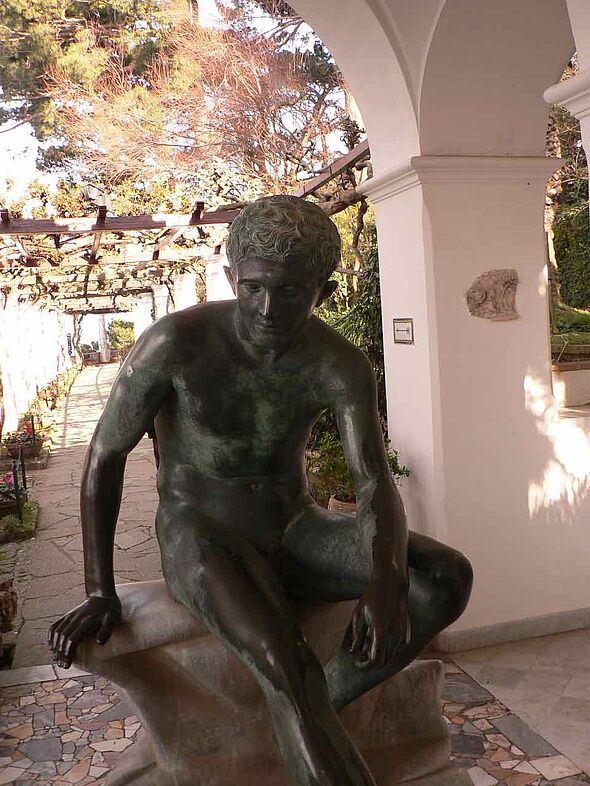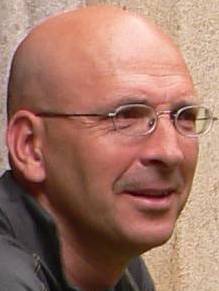next therapy group
The next therapy group will take place from April to July 2026.
Due to the high intensity and remarkable effectiveness of this group work, which requires a particularly strong sense of trust, courage, as well as active and collaborative motivation for therapy and change, all participants have already established a very solid and trusting therapeutic relationship with Egon through individual therapy prior to joining the new group. This strong foundation enables all group members to engage in the shared process with personal commitment and confidence.
group therapy and Self-Exploration in Hamburg Altona Ottensen & Plön Holstein
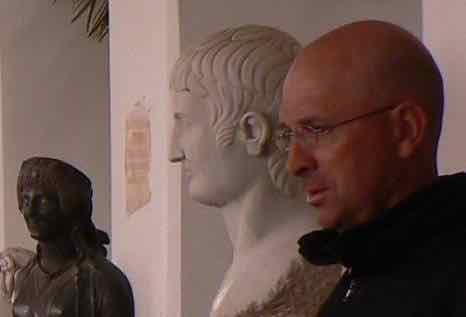
|
This group therapy is a growth-oriented and change-oriented group therapy and offers the advantages of therapy with a therapist and the advantages of group experience simultaneously.
I Egon am active as a therapist just as in individual therapy.
Additionally, there is the experience of group dynamics and the self-experience of interaction with other people.
This is experience-oriented group therapy work. We work in the here and now on real situations that occur interpersonally here. The group therapist actively supports the group process so that internal and external interactive relationships taking place in the therapy room can be felt and made conscious. This creates clear emotional states, often very intense, which the entire group reflects upon mindfully, spontaneously and then carefully, first in the group and subsequently in writing alone.
In my group therapy work, I employ emotion-focused approaches from schema therapy, gestalt therapy and emotion-focused therapy. Feelings are intensified by making inner experiences deliberately concrete, physical and interpersonally experienceable – instead of treating them abstractly or purely mentally. When parts of the self are brought outward, authentic encounters emerge: What was previously an internal monologue becomes an actual occurrence between people in the present moment. This triggers emotional processes far more strongly than mere thinking or reporting. The feeling is no longer just observed – one is in the midst of it.
Emotions are experienced and expressed physically, not just put into words. Participants move, change their posture, their vocal tone, their facial expression and their breathing. Feelings are anchored in the body and are evoked there – posture and voice act directly on the limbic system and the autonomic nervous system. Changes in physical state lead more quickly to deeper emotional states than understanding alone: The body carries the memory and intensifies the experience. In parallel, I Egon as therapist slow down what is happening and direct attention inward: "Stay with this feeling," "What are you noticing right now in your chest?", "Say it again, but more immediately." This reduces mental evasive maneuvers and narrative distance. When attention is held, emotional activation increases – subtle changes such as tensions, warmth or tears are perceived and expanded. Feelings unfold when they are experienced without possibility of escape.
Through activating emotional opposites through immediate interactions between group members, strong emotional tensions arise. Opposing emotional systems are stimulated simultaneously, hidden feelings reveal themselves in response to confrontation, criticism or distancing. The tension between different inner parts increases emotional power: Contradiction generates emotional energy. Group members are encouraged to speak from the I-perspective, to choose emotionally charged words and to address their counterpart directly. Direct address in the now activates emotional memory and evokes attachment feelings, shame, anger or sadness – emotional meaning becomes present rather than merely mental. Telling someone something personally works more powerfully than talking about that person.
Primary feelings possess a stronger biological effect and greater organizing power than subsequent or defensive reactions. When protective mechanisms are set aside, vulnerability shows itself, and emotional truth emerges with greater intensity. As therapist, I Egon deliberately interrupt reason-emphasized explanations, extensive storytelling and distanced reporting. Avoidance normally dampens feelings – by remaining in immediate experience, these dampeners fall away, and group members can no longer escape through thinking. Emotion gains strength when escape routes are blocked. In this work, emotions are lived through, intensified and transformed.
The real experience taking place here enables a better getting to know oneself and an active, supported self-development process for changing disturbed relationship schemas, mental schemas, internal and interpersonal attitudes and behavioral patterns. We work clearly change-oriented. High group therapy and change motivation is a basic requirement. All group members have already worked and work parallel to group therapy in individual sessions with Egon. This is combination therapy (= individual + group therapy). A strong working alliance with Egon before admission to the therapy group is a prerequisite.
I consider these small therapy groups to be the most efficient method of all for increasing social interactional competencies and for overcoming multiple problem areas (e.g. social anxieties, self-insecurity, depression, developments after trauma in relationships with other people, consequences of personality disorders in social relationships and in dealing with oneself, among many others).
I love these therapy groups because they enable psychotherapy in a real, protected laboratory.
To ensure appropriate patient-centered case processing, only 4 people participate in my therapy groups.
4-Coaches-Principle: Each group consists of the 4 group members and the therapist: 5 people.
I Egon as therapist have the help of 3 co-therapists here to help a patient.
I Egon offer small therapy groups so that we can work tailored to the needs of each group member.
Since the group is so small, there is much time and attention for the concrete learning processes of each individual group member.
Work is coping-oriented. All members in the group are constantly active in the (self and other) support process.
In doing so, one practices paying attention to oneself while paying attention to another group member. Working on oneself while working with another group member. Expanding self-perception while deepening perception of others. It is pure 150-minute self-experience in real 150-minute interaction. Everyone works the entire time on their own conflicts and goals, while another group member serves as a trigger. The compassionate, active therapist ensures this. Each group member learns to ensure this in this practical laboratory: an interactive learning process that becomes ever deeper and seizes ever more feelings, thought patterns and impulses. An interaction between self-perception, perception of others, meditative and interactive mindfulness and action with each other creates a change process: active learning in the group.
My therapy groups work in a completely protected framework. This means:
Confidentiality. My attitude as group leader is strictly benevolent toward each group member. Each group member decides whether and when work is done on a concrete difficulty, whether and when a private matter is addressed. Pressure is not allowed. Verbal violence is not allowed. Respect is mandatory.
A 150-minute group session takes place every week. There is no vacation during the group process. Everyone reserves this entire time free for this process. All 4 group members always participate in all sessions.
The participants in the group do not change. The 4 group participants and the therapist form a strong, deeply trusted unit from the 1st to the last session: always together in strong belonging.
If you would like to participate in a therapy group, it is required that you first engage in individual therapy with my professional support. A trusting therapeutic relationship between us must already be established before you can be considered for a therapy group.
Our therapy groups are very intensive and oriented toward sustainable change processes. They require committed collaboration, strong group cohesion and very active participation over several months. Group members are carefully selected exclusively from my circle of individual patients to ensure a beneficial and harmonious group constellation.
These groups take place weekly in Hamburg Altona Ottensen and twice for an intensive in Egon's practice in Hohwacht at the Baltic Sea with group accommodation in an apartment in Plön Holstein. In addition to the sessions in Egon's practices, the members meet as a self-help group for various additional therapy tasks without Egon during the week. It is an intensive process with the group during these months.
THE GROUP THERAPIST
Hamburg Altona Ottensen & Plön Holstein
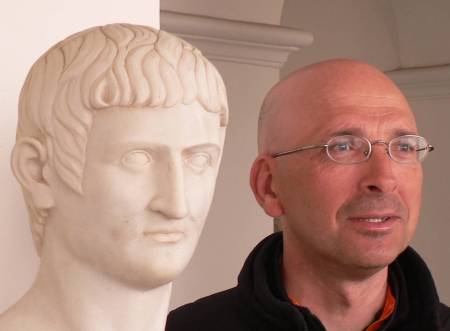
|
Egon Molineus M.A. (Psychology), psychological psychotherapist, is trained for many years in leading
- Disorder-specific and mixed behavioral therapy groups according to the requirements of the Association of Statutory Health Insurance Physicians
- Depth psychology-based therapy groups.
- And also for leading self-exploration groups based on the humanistic approach to group therapy.
- Systemically-based coaching groups. My attitude as group leader is strictly benevolent toward each group member.
The therapist
- Ensures that the focus patient's goal is continuously pursued
- Ensures that no other participant moves into the center of the group when one person is working seriously.
- Names obstacles
- Describes the emerging conflicts with the contributions and coping attempts of individual participants
- Describes norms and rules with their functional and dysfunctional aspects
- Requests a brief interruption of the work
- Enables brief time-outs for tension reduction
- Promotes joint long-term, conscious control and change of relationship behavior.
- Promotes interactions between group members
- Promotes self-responsibility and shared responsibility of patients
- Gives feedback
- Confronts the group with its behavior
- Stimulates problematic interpersonal interactions in the group toward self-reflection
- Ensures the maintenance of group integrity and the promotion of cohesion
- Ensures the preservation of the working atmosphere
- Provides relief after stressful episodes or topics
- Sets tasks for participants
- Supportive-facilitative basic attitude
- Contributes to individual participants establishing relationships with each other
- Checks to what extent the goal was achieved by asking the focus patient about their satisfaction with the result of the collaboration
- Checks whether participants have understood and are following the group rules
- Supports critical reflection
- Supports patients in achieving their goals
- Conveys information and learning content
- Points out boundaries
- Shows solidarity with outsiders so they can be integrated, then demands their cooperation and promotes the group's acceptance of the outsider
Behavior in the therapy group
Behavior in group therapy Behavioral rules for the self-exploration group Experience-oriented group therapy In our group therapy, the focus is on real and present experiences through interaction with the people present. Conversations about the disorder or reflective analyses take place outside the sessions. We experience self-exploration here: a recognition of oneself in exchange, contact, closeness, distance and perception. Social experiencing and trying out new behaviors are in the foreground. This protected space with clear rules and a supportive therapist offers the opportunity to get to know yourself better and to improve social competencies as well as self-regulation. Self-responsibility Your behavior influences the success of your therapy and that of the entire group. Your active participation and self-responsibility are decisive. If the group is endangered, the group leader ends the session. Active participation You are not a spectator, but actively involved. Don't constantly repeat old behaviors, but try out new ones. This leads to growth and insights about your problems. Positive feedback promotes functional behavior, while dysfunctional behavior is clearly signaled. Interactive self-disclosure It is important to make relevant parts of your inner world visible to the group. This happens through actively contributing your momentary experience. This way you improve your social competencies and act responsibly. Self-perception and self-expression Pay attention to your feelings, thoughts and sensations and share them immediately. Expression can be verbal, paraverbal or nonverbal. Don't hold back your experiences so as not to block the group's dynamics. Be courageous! Perception of others and feedback Observe the processes, communications and emotions of the other group members and react to them. Your feedback helps the focus patient and is valuable for therapy, regardless of whether it is projection or mirroring. Projection Projections are desired and necessary. They promote group dynamics and the therapy process. Taking responsibility for your reactions can be painful, but is necessary for deeper changes. Patient and coach In the group you work both as a patient and as a coach. Actively support the others through mirroring, feedback and confrontation. Involve yourself completely and risk showing something of yourself. Intuitive work and verbalized awareness Cognitive clarity should emerge from intuitive, emotional work, which can then be verbalized. This enables recognition of behavioral patterns and planning of concrete changes. Repeating focus member Working with a focus member can take several sessions. When you fully involve yourself, all group members benefit from it. Structure The group has flexible structures to break through the structures of disorders and promote flexibility. Multiple processes can occur simultaneously and are often deeply interconnected. (No) happy ending: The open gestalt A happy ending is not always the best outcome. A painful outcome can have more power for change by increasing motivation for change. Expression (not) on request: Not a meditation session Feelings and impulses should be expressed spontaneously, without prompting by the therapist. This promotes awareness of feelings and needs and prevents psychological problems. Our therapy aims to react actively and courageously in interpersonal experiences and to participate vividly in life. Worth knowing about the group leader Egon Molineus, an experienced and unconventional group leader, accompanies you through the process. His methods are provocative and confrontational, but always supportive and compassionate, to enable you to have genuine self-exploration.
RULES AND NORMS in the therapy group
- Social responsibility in group therapy:
- Handle criticism carefully: Criticize the issue, not the person. Refrain from insults
- Pay attention to how the other person is doing.
- Do NOT restrain yourself when you notice that you are putting yourself in the center of the therapy group too frequently or for too long. The thought, "I should leave the others just as much time" is mindfucking here, i.e. psychological defense. Simply notice it and continue!
- Mutual consideration: e.g. others in the therapy group
- Participation in road traffic requires constant caution and mutual consideration. Every road user must behave in such a way that no one else is harmed, endangered or hindered or annoyed more than is unavoidable under the circumstances.
- The guideline separates individual lanes from each other. It may be crossed for overtaking or for avoiding obstacles if other road users are not hindered or endangered by this.
- Dealing with strong emotional distress: "Feelings and crying are allowed in the therapy group"
- Regulation of behavioral excesses: no violence whatsoever is allowed in the therapy group (neither physical nor verbal)
- Therapy begins where clarity ends.
- Therapy makes demands on the participants of the therapy group. It does not serve to stabilize the sick system.
- Address directly, not through third parties in the therapy group.
- It's about processing (relating to feelings), not about "telling" content.
- Stay in contact with the others in the group. Be interested in the other participants of the therapy group when it's their turn.
- Each participant of the therapy group takes responsibility for what they themselves make of this session.
- Open communication of one's own experience.
- Punctuality and regularity of participation in group therapy.
- Free interaction
- Confidentiality.
- Couple formation within the therapy group is allowed.
- Refrain from immediately defending yourself. Instead, let feedback in the therapy group take effect.
GOALS in the therapy group
The overall goal of the therapy group is to reflect on and change, under professionally protected conditions, the behavior and life conditions that cause and maintain suffering, so that growth and health are promoted.
INDIVIDUAL GOALS of the therapy group:
- Work out anxieties and fears in relationships as inhibition of competent behavior. Identify triggers.
- Anticipation of the effects of one's own behavior on others
- Processing of defined topics
- Differentiated perception of affects.
- Emotion management.
- Promotion of tolerance toward diversity in the therapy group and beyond.
- Increase frustration tolerance.
- Coping with specific life phases
- Intensification of communication within and outside the therapy group
- Learn to cope with interpersonal problem situations.
- Communication training in the therapy group
- Life course crises
- Build behavior that is socially reinforced.
- Reduction of anxiety
- Respectful openness to the unfamiliar
- Avoid relapses (tertiary prevention)
- Promote self-criticism.
- Finding and achieving meaning, decisions and goals.
- Strengthening the sense of belonging within and outside the therapy group
- Increasing self-responsibility in dealing with the illness.
- Stress management.
- Change of habitual relationship patterns
- Change of behaviors with unfavorable effects first in the therapy group and then in everyday life
- Reduce avoidance tendencies, situation mastery.
- Conveyance of information about the illness and its treatment.
- Learn to cope with interpersonal problem situations leading to experienced self-efficacy within and outside the therapy group.
- Learn and practice problem-solving
- Development of possibilities for conflict resolution, tolerance and self-confidence
- Processing of difficult interpersonal topics
- Analysis of stress factors in private and professional life.
- Real analysis of one's own coping patterns in problem situations.
- Observation of self-perception (body perception/ emotion perception/ self-awareness) and perception of others in real interaction situations.
- Reflection on one's own self-image. "Who am I really?". "Who do I want to become?". Discovery of self-underestimation and self-overestimation. Difference between self-image and ideal self-image.
- Reflection on the image others have. Practice of empathy ability/ empathic capacity.
- Relapse prevention
Methods of group therapy

|
My methodology of group therapy in Hamburg Altona Ottensen and Plön Holstein is tailored according to group constellation:
- "Therapy of an individual in the entire therapy group," when the other group members act as participating observers.
- Or "Therapy of the individual through the group," when the entire group works as a therapeutic tool (emphasis on the current situation of togetherness in the here and now).
METHOD of my therapy group:
- ABC model according to Albert Ellis
- Activity building
- Work with empty chairs
- ATP Assertiveness Training Program according to Ullrich de Muynck
- Building reinforcing activities.
- Bioenergetic exercises
- Try out previously unfamiliar behaviors
- Direct observation of the development of interpersonal difficulties and their triggers
- Direct practice of interpersonal behavior
- Assertiveness exercises.
- Relaxation techniques.
- Exchange of experiences.
- Experience of affects.
- Acquisition of tension-reducing measures (skills).
- A situation from everyday life reported by the focus patient is processed.
- Focus on specific stress situations.
- Mutual assistance within the therapy group
- Joint evaluation of behavior protocols.
- Information transmission about the respective disorder
- Small group work
- Cognitive restructuring
- Communication exercises.
- Learning from models.
- Moderated conversations.
- Pro-con lists
- Problem analysis
- Reflection on the roles assumed by participants
- Role plays.
- Self-confidence exercises
- Provide mutual support in the therapy group.
- Develop strategies for dealing with the illness.
- Sculpture work according to Albert Pesso
- Social competence training
- Playing field for experiments.
- Structured feedback.
- System constellations
- Structuring the day.
- Exercises for building and improving social behavior.
- Behavior analyses
- Behavior observation in the therapy group.
- Behavior rehearsals.
- Conveyance of models about the development and maintenance of the disorder
- Goal definition
EFFECTS and THERAPEUTIC FACTORS OF GROUP THERAPY
Hamburg Altona Ottensen & Plön Holstein
- Repressed feelings and energies become free for recovery and personality development.
- Affect differentiation
- Affect perception
- Acceptance: Each participant of the therapy group also belongs to the group when they do not unconditionally submit to the group opinion, but claim autonomy
- Anticipation of one's own behavior
- Finding and checking alternative evaluations
- The group members notice in the therapy group that they are not alone with their problem. People (older and younger, men and women, poorer and richer, sicker and healthier) with the same and with different fates come together, practice opening up to others, giving feedback to the other group members.
- The therapy group promotes and challenges the group member.
- A theme becomes clear in the interactions between the participants
- Instillation of hope, because other members of the therapy group cope with similar difficulties.
- Emotional cohesion grows within and outside the therapy group.
- Emotion management: Avoided behaviors, feelings and experiences can be revealed in a protected environment.
- Development of techniques of interpersonal interaction through my observation of the other members of the therapy group and through their feedback.
- Experience of the universality of suffering.
- Experience of affects
- Experience of altruism raises self-esteem.
- Acquisition of interpersonal skills
- Conflicts emerge within the therapy group
- Feedback and support through the therapy group
- Better integrate feelings.
- The members of the therapy group feel understood by the others in the therapy group and learn to understand others and themselves.
- Conversations with mutual exchange of experiences are made possible.
- Healthy handling of aggression and new coping strategies against the disorder are practiced.
- Group cohesion.
- Action orientation:
- Identification of commonalities with other participants of the therapy group
- Enactment in group therapy of difficulties with other people outside the therapy group
- Interactive difficulties can be analyzed in the therapy group and overcome through practicing role plays with alternative interaction models and feedback from other group members.
- Interpersonal learning of social competence through feedback about the effect of behavior
- Catharsis
- Cohesion
- Cooperative work attitude: Active participation + attention in the group + completion of homework
- Corrective recapitulation of the primary family group
- Learning from the model of patients or the therapist
- Communication of information
- Imitative behavior through trying out different identifications.
- New experiences in interactions
- New immediate relationships emerge and are made into topics and reflected upon.
- Openness: The participant brings in their own topic because they trust the group that the others will treat them caringly and supportively
- Reality testing
- Group therapy works against isolation in society.
- Social competencies (e.g. representing one's own needs, giving and receiving criticism, resolving conflicts) are practiced.
- Instead of resignation and self-abandonment, a sense of community, self-confidence and creative will for healing can then emerge.
- Gradual behavior building
- Transference processes.
- Improvement of social perception.
- Reduction of transference-related distortions
- Trust of the entire group: The group is capable of processing stressful topics
- Role model of fellow patients who are more advanced in treatment and coping strategies
- Sense of belonging: the participants support each other mutually
Intellectualization and rationalization in group therapy
Intellectualization and rationalization When a group member intellectualizes and rationalizes during the group therapy process, they limit their processing to rational reason and ignore emotional, physical and deeply felt aspects of their present reality, which are often of crucial importance. They behave as if they are acting and thinking correctly according to the social, moral and logical rules of our established society, but in reality they are a well-dressed liar, controlled by shame or fear. They work to maintain an old, corrupt regime – the regime of their own psychological disorder. The main goal is the maintenance of a blockade that leads the therapy process of the entire group into a dead end, so that their deeply hidden truth remains invisible: the pain, the fear, the shame, the disgust... and how they sold their soul for it. Because it would require much honesty, courage, willpower, acceptance, self-feeling and self-love to resist this devil. They pretend they must understand something, as if there must be an order that needs to be conquered under mental control. But in truth it's about control under the dictatorship of the disorder – the dictatorship of the intellect. The tools of the person, here the intelligence, have taken power over them and are no longer available to them. This happens in secret. If someone tries to speak against it – be it their own gut or another emotionally charged group member – they are immediately disqualified. On this basis, group therapy becomes coffee talk, a waste of time and money for all group members. In behavioral therapy and psychoanalysis, we use our intellect as an instrument to expose and change cognitive distortions, old thought errors and dysfunctional thought patterns. It is indeed about a change at the level of understanding. However, this is only part of the work we do in psychotherapy. Psychotherapeutic healing happens at the level of feeling, where the stored ideas and the associated deep consequences for oneself come together. At this depth are the emotions that are irrationally controlled. Here the mind no longer works. For this we use other tools: intuition, sensitivity, deep emotional and psychosomatic self-perception and perception of others. And we practice achieving, even mastering, a deliberate, spontaneous, free-flowing handling. Those of you who know Japanese martial arts can understand it: The samurai does not think. He is completely awake, in deep contact with everything that is. His body acts without the head. The head is too slow. Only this way can he survive. That is the basis of Zen Buddhism. As fast as the wind. That is feeling.
Reflection after the group session: Guidance aids
- The reflection is written absolutely strictly for oneself.
- It is an instrument for deepening integration and self-development
- The goal consists of a deeper comprehension and classification for oneself of what was experienced in the session.
- The reflection is not a means of communication.
- A reflection only with oneself and for oneself.
- The content of the reflection refers exclusively to the 150-minute session period. Only this period. Reporting about further facts is not content for the reflection.
- This is a matter that is expressed personally in the therapy room.
- In the reflection, the feelings are captured verbally and the question marks, insights important to oneself...
- It is an instrument for deepening integration and self-development.
- Writing the reflection is part of the session. The group reflections are to be written immediately after leaving the therapy room, during this period when the feelings are still current. Only upon sending is the session completed. A later execution no longer belongs to this session, because it is an intellectual engagement with a session that took place earlier.
- An addendum to the group reflection is not permitted.
- Goal and homework in group therapy are established for the work in the next session. This is about intensifying the therapy gain.
- In the reflection, no protocol of the session is narrated. It is not narrated what took place in the session.
- In the group reflection it is about reflectively verbalizing for oneself the aspects that are of deep psychotherapeutic significance for oneself.
- In the reflection, only events that took place in the session are reflected upon.
- In the reflection: The goal and the homework should be captured and established precisely for the exact matter. Please read my detailed explanations on reflection on my website.
- The reflection of the group session forms the basis for the self-development project in this area. This means that the gained insights and open questions are immediately integrated into the self-modification project and continuously developed further in the coming weeks. This happens systematically and purposefully. Therefore, concrete behavioral experiments and practice-oriented tasks are developed that are immediately implemented and dynamically optimized.
Your report about your group therapy process at the end of the group
Group progress report Your group therapy with the group has ended. Now you should write your own progress report about this experience. For this you should read the reflections from yourself for each session:
- First you read the reflections on the first session. Then you write down your own thoughts. 2. Subsequently you read the reflections on the second session and write your own impressions again. 3. You proceed this way with all further sessions. When you are finished with this, then reflect on the entire group process and write about additional aspects that occur to you. The following aspects are very important and you should write about them:
- Changes in yourself: What has changed in you and about you? How did this come about? - Symptoms of your disorder: Were there new symptoms? Which symptoms have you overcome? How was your disorder before and how is it after therapy? - Concrete changes: How have you achieved concrete changes with the help of the group process? Consider changes in your suffering, your problems and your social, interpersonal relationship patterns. - Important interpersonal experiences: Which concrete situations and interactions in the group helped you? What did you concretely do to cope with challenges in the group process? - Intense challenges: What particularly intense or difficult challenges were there for you? Which behavioral experiments did you design in these interpersonal experiences? - Impressions and consequences: What impressions did the other people make on you and what consequences did these impressions have? - Learning units: What important lessons have you learned? What were your experiences with your reflections, your homework and your goals from session to session? - Achievements: What achievements did you have in this active process? What was your position on the axis passivity versus activity? - Relationship with the group therapist: How did the group therapist help you? How was your relationship with him and which figures did you project onto him? - Relationships with group members: How was your concrete relationship with each group member and how did these relationships influence your process? How did these relationships help you? - Not achieved: What did you not accomplish in this group and what would you like to achieve in the next group? What was the reason that you did not accomplish something concrete in the last group? - Motivational reactions: How did you react motivationally to the various situations and moments in the group? - Participation in new group therapy: Would you like to participate in a new group therapy? Why? What will you do differently in the next therapy group? Use these guiding questions to create a comprehensive and reflective report about your experiences in group therapy.
Self-experiences in group therapy
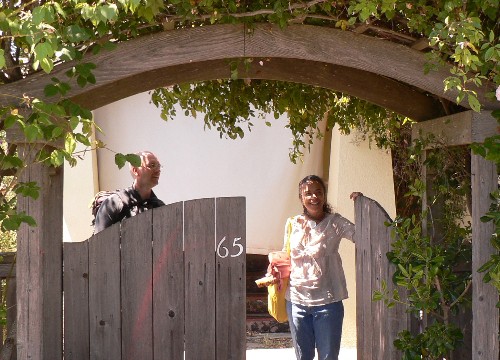
|
Group participants report here about their self-exploration group / therapy group / coaching group. Former members of completed groups have written here about their self-experience, so that people interested in group therapy / group coaching can have more information when they feel uncertain before the group experience.
AA reports after his combination therapy with individual and experience-oriented group therapy

|
Dear Egon, you are welcome to publish the following lines for your website with the pseudonym AA: "Egon led the group therapy and individual therapy with high professionalism, impressive commitment and full energy. How much Egon loves his profession is shown to me above all in his extraordinary creativity in developing the group process and especially in responding to unpredictable events and repeatedly offering appropriate approaches for them. With alert and full energy, he managed to bring each participant in the sessions into contact with their individual questions/problems/difficulties, so that nourishment for their therapy process is offered to each group participant at the most diverse levels. Chapeau! Egon's gift of calling processes by their name, even presenting them confrontationally, please me very much, as they give me the opportunities to work through them dialogically and to get 'substance to the matter'. Nevertheless, Egon acts very sensitively and vigilantly in doing so, as fundamentally in all sessions. I feel completely accepted here in my vulnerability, so that the therapeutic process finds a safe space through Egon in its openness. Best conditions for healing!!!" (A.A.)
KY reports after completing his 2nd group therapy experience

|
Thanks to the two very intensive and profound group therapies that I have done, I have now understood the following emotionally (which is much deeper than rationally): I KNOW WHO I AM. I AM RIGHT. I AM WORTH IT. For the first time since I can remember, I can get up in the morning without having a heavy feeling in my stomach. Intense. Thanks to the gladiator group and to Egon!
XY reports about her experiences in this group
In this way I would like to express my deeply felt gratitude for the experiences I was able to have in group therapy and to all the people who supported me in the group sessions so that it is now possible again: to like myself, various blockages were cleared away, to feel my creativity again, to get my eating disorder under control and much energy and feelings are noticeable. My energy level was pretty far down before the group behavioral therapy, creativity had a total failure and emotionally the wind was also out. Physically I was struggling with various problems that brought a psychosomatic background to light.
It was beyond my imagination what could happen in group therapy. I had not expected that I would be confronted there in the group with what I deal with in my everyday life. In the sessions I reacted to exactly the things I encounter in family, work, friendships and social contexts. That was relieving in the group sessions because the situations are often identical but the reactions of the group participants and the therapist are completely different from those in my everyday life. This way I could perceive how much deeper anger sits in me, triggered by a situation in the group that angered me, but I swallowed the anger instead of verbalizing it. I experience this constantly in my everyday life, I just wasn't aware of it. Through Egon's attention, who sensed my annoyance and inquired, I was able to contribute my anger and thus also resolve it, instead of storing it physically and being dissatisfied. In these group therapy sessions it's about attention, about care and about empathy. Both for my own and for that of the other participants. Through these constellations it was possible for me to perceive the reflections from a different perspective. That was very helpful, since from my own perspective I often could not find a solution for all my problems that lie dormant in me. Only during the group sessions did it really become clear to me that I suffered from a massive eating disorder, which I could only admit to myself there. That was totally uncomfortable to say out loud and bring into the group. That I even said it out loud is thanks to the supportive manner of the therapist, who repeatedly encouraged us to verbalize what torments, burdens, inhibits or blocks us. He always said: this is your chance to bring everything into the room here, there are 4 people here in the room for you who support you in the process that then gets going after what burdens you is spoken out loud.
My eating disorder has to do with the fact that I secretly and greedily stuffed huge amounts of everything edible into myself and despised and hated myself for exactly that after these binge eating episodes. After what I experienced in the group in terms of attention, empathy, concrete and well-applicable tips and also deeper and painful insights into the developmental history of the disorder, I can now counteract these attacks with the help of a self-developed concept. That gives me a very good feeling of personal responsibility. As a result, I no longer feel at the mercy of this behavior, but can decide self-determinedly what, when, where and how I prepare my food. I now manage to prepare my food in small quantities, sit down at the table with it and slowly enjoy a meal. That does my self-esteem very good and always touches me with much joy.
Through these relieving experiences, I had the courage to also bring other painful and sad personal experiences/traumas into the group and process them. A healing process has been set in motion for which I am grateful every day.
A.A. said after his group experience:
[Translate to English:] Hallo Egon,
habe lange überlegt, was ich zu meinen Erfahrungen in der Gruppentherapie schreiben könnte.
Diese Aussage trifft es am besten.
"MUT – OFFENHEIT – RESPEKT
Werte die gelebt werden, Werte die helfen.
Eine unglaublich wertvolle und helfende Erfahrung, die frei macht.
ICH – BIN – FREI
Danke."
B.B. wrote after her group therapy:
Hello Egon, I am sending you below my words/thoughts/experiences about group therapy: My experiences in a group therapy I had also wondered what I could imagine about it. The information about group therapy only gave me a small idea. What ultimately encouraged me was that the therapist monitors compliance with norms and rules. So I thought to myself, nothing bad will happen to me. Full of anticipation and very nervous, I went to the first session. The group consists of four patients and the therapist Egon. My group consisted of two men and two women. We were very different in character and in life experiences, as we discovered in the course of group therapy. But despite differences there were overlaps and parallels in the problems. My encouragement is: only those who muster the courage and tell about their problems thereby gain the trust of the group and receive the chance to change something. Since ultimately everyone reveals something about themselves and there is a confidentiality obligation, fear should not block. We four had the experience that the feared reactions did not occur. Understanding or interest as well as empathy were the reactions. Furthermore, a group lives through courage to openness. Trust and understanding thus grow in the group. Quickly we no longer had a strange feeling and perceived the group as help. How must one now imagine the course? Basically all four patients introduce themselves and tell about their problem. However, the introduction round can also last over several sessions, since the course of a session is not predictable and is determined according to the current situation. A patient tells about their situation and the fellow patients give feedback on it or ask questions. This can change the topic and sometimes also the "focus patient". But even if one is not currently in the "center", it doesn't mean that one can't learn anything from it. A group therapy requires 100 minutes of attention. Since there are parallels in the problems, one can also draw conclusions from another patient's situation. Thus one can learn not only exclusively through the received feedback. In the group, solution approaches for the problem can be discussed. Through four other perspectives, one's own perspective can possibly be corrected and thus contribute to resolving the problem. Group therapy helped me to get an overview of my "problems". Through this therapy I got to know myself more closely and became more aware of some things. The exercises in the group helped decisively in this. Among the exercises one can imagine something like autogenic training or small role plays. The thoughts and feelings are queried by the therapist. It was amazing what reactions of the body were partly possible through the energy of the group. Maybe this sounds very spiritual now - I hadn't thought it possible before either - but with concentration on one's body, changes could be noticed. To give an example: I had noticed during exercises that I had no connection to my belly. By the end of therapy I could feel (energy in) my belly. Therapy means courage. Courage to change. The courage will pay off! I wish the courage and a successful therapy.
C.C. tells after her group experience:
Before group therapy, I was already in individual therapy with Egon due to my trauma. He encouraged me to try this, as it could help me with coping with my problem. Since a work accident I have a handicap that I try to conceal so that I wouldn't be asked about it. The confrontation constantly stirred me up emotionally and I didn't want to suffer anymore, feel this pain or have the feeling that I'm missing something, so I'm worth less than others. I was a little anxious, nevertheless I was curious about what people I would meet, what problems they have. Should I actually not be completely alone with my problems? In the first hour we all introduced ourselves, told why we are there. Egon was there as a "mediator", gave the impetus at important phases. That is, when what was told by a person in the group should be further discussed, intensified. The conversations about my handicap, how the others would react to me, helped me a lot and I was able to reduce my fear of showing myself to others as I am. After the end of the group I felt complete and am healed. The interaction with each other was very considerate, nevertheless everyone said what they thought and it never left the therapy room. With the consent of all involved, I also brought my partner at the time and discussed important problems with him openly in the group. The others tried to convey his view of things to me and vice versa, so that we could benefit for ourselves from the experiences of the others and understood the other better. I think in retrospect that the group dynamized my healing process. I was able to grow and recover faster. You share something, are there for each other, help each other, it is a different feeling than talking with "one" therapist, you have many opinions on one point, as in reality too, there are always many solutions and you stand in a strong community!
D.D. reports after group therapy:
"I struggled with myself for a long time about whether I should start group therapy or not. At first it was hard for me to imagine opening up in the circle of three strangers and telling about my past and my current problems. But I dared to take this step and let myself get involved with the group. Ultimately I was thereby confronted with completely new problems and quickly noticed how hard it was for me to open up. But this resistance then clearly showed me that I myself didn't want to accept my trauma past and therefore had such problems getting involved with the group. When I finally understood this connection, I dared to take the step and told the group about my experiences, memories and feelings. How important this step was only became apparent afterwards and would not have happened without the group. Shaped by this first group experience, I got involved in group therapy again a year later. I quickly noticed that I could enter or get involved in a completely different way. When it came more specifically to trauma work, I feared a collective helplessness, which however did not arise. The other three group participants acted like an emotional support that first made it possible to look so closely. The two group experiences were important building blocks on my path of healing and I am glad in retrospect that I got involved in it."
E.E. reports before her group therapy
From individual to group therapy When I came to Egon for individual therapy, I was sure that group therapy was nothing for me. Already with Egon it was difficult for me to open up – how should that then be possible with 3 strangers at once? But in the course of my individual therapy my attitude changed. I recognized that a group can be not threat but protection. The confidential conversation with people who also have to deal with stressful topics, the mutual feedback and the experiences from one's own experience – in this I now see the strengths of group therapy. I believe that such a trusting basis can emerge in which one can also discuss and heal the topics that touch the heart in its innermost, there where we are all so vulnerable. And indeed more than an individual therapy session is able to do.
E.E. tells after her first group therapy in Psychotherapy-Hamburg-Altona
After my first group Finally, despite all fears and concerns, I did it – took the step to group therapy. At the beginning I was more excited than before an important exam. Like a pusher in bobsledding, Egon pushed me already in the first hour onto the "hot seat" – the place where the person sits who is currently in focus. It was delicate, a jump into cold water, it also hurt, but afterwards it was like a liberation. For me the group was often an exciting, emotional rollercoaster ride. A great experience to see how all group members open up over time, how we share very personal experiences and feelings. Trust developed. The feedback from the others gave me a different view of myself. I learn from this. I have decided to attend another group with Egon, because I now know that I can go further, dare more and will be caught on this path in the group.
F.F. tells about his experience in group therapy

|
My experience with group therapy is thoroughly positive. At the beginning of my therapy stood, as with every other person too, the decision individual or group therapy. It took some time and persuasive skills on the part of the group therapist Egon. I, who most reluctantly talks about feelings and problems, should open up to three completely strange people? Completely unthinkable. The fear that the other participants wouldn't take me seriously or perhaps wouldn't like me because of my problems was quite big. The feeling that everyone must love me, like me, respect me, I must be perfect, stood totally in the way. But I noticed very quickly, if I want to change something in my life, I should get involved in something new. After a few individual sessions I decided on group therapy. Looking back, that was the only right decision. I wanted to actively participate in my life and had to change something myself. That is the first important step for group therapy.
In the group itself the most diverse characters met and it is initially an unfamiliar situation. It was quite difficult for me to express myself about my feelings and fears in front of completely strange people. Nevertheless it worked because Egon repeatedly encouraged us. It helped me that everything we told about ourselves remained in the therapy room. The composition of the group was also decisive. Egon always selected the group participants with the right instinct. I had always felt well taken care of in the group.
Meanwhile I have completed the third group therapy and must say that I feel much more secure with myself and my life. The path there was not always easy though. I had to learn that I may not close my eyes to my problems and that it is very important to perceive my feelings and also to express them. To feel and appreciate myself, regardless of what others think about me. No person is perfect. Mistakes are nothing wrong, they belong to you and me. There is no person in the world who is loved by everyone, just as little as I like all people. This realization became conscious to me in the course of group therapy. I could also tell other group participants without problem what bothers me about them and what problems I see in them. That was completely unthinkable before group therapy.
Meanwhile I am at the point where I sense when something is not right with me and can mostly also express it. Of course one must be honest with oneself and not pretend anything. I have learned that it only depends on myself and I have my life in my own hands. Other people are not responsible for me feeling good, but only I myself. I have learned to notice what is good for me and what I can do so that I feel good. Communicate and talk about my feelings and not swallow them down and choke on them. The reflections that are written after each session also helped me with this. There I could reproduce the felt feelings and situations again in writing and feel and deepen my thoughts about them.
For the next individual appointments I strive to discuss current situations and work out tips and help. It is important that I work these out myself and don't expect them to be served by Egon "on a silver platter".
That was also decisive for group therapy. We worked everything out ourselves and Egon accompanied us.
After the three group therapies with Egon I can only advise everyone to have this experience themselves. It brought me a lot and I feel freer and more comfortable than I have ever felt. That alone is already a reason to restart one's life with group therapy.
G.G. tells after group therapy

|
How did the therapist help me with this? Egon was always there for me. I could let myself fall completely, although it was very difficult for me at the beginning. With increasing duration I gained more and more trust in the therapy. That was also because Egon always encouraged me. He was very empathetic when it had to be. But he was also demanding when he had the impression that I was standing in my own way. No matter what happens in therapy, it is important that one trusts the therapist. Only this way can I let myself fall and actively work on my problems.






